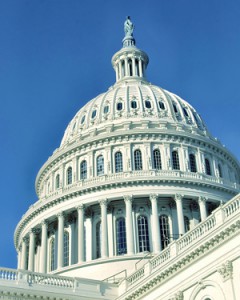On the Hill: Darwin Day Introduced in House of Representatives

The new session of a Republican-controlled Congress is now underway, and President-elect Donald J. Trump will be sworn into office in just a few days. Given the circumstances, most humanists expect that anti-science legislation is waiting in the legislative pipeline to become law, especially considering a tweet by Trump stating that “the concept of global warming was created by and for the Chinese in order to make US manufacturing non-competitive.”
But humanists still have a voice in Congress, and we are working hard to ensure that bills and laws remain pro-science and supportive of fact-based thinking in general. Thanks to the hard work of the American Humanist Association’s legislative team, H. Res. 44, the Darwin Day Resolution, has been introduced in the US House of Representatives for the sixth time since 2011. We are proud to have worked with Representative Jim Himes (D-CT) to introduce the resolution, which:
- States that evolution “provides humanity with a logical and intellectually compelling explanation for the diversity of life on Earth”;
- Demands that the “advancement of science be protected from those unconcerned with the adverse impacts of global warming and climate change”; and
- Confirms that the “teaching of creationism in some public schools compromises the scientific and academic integrity of the United States’ education systems.”
Current co-sponsors of the resolution include:
Representatives Judy Chu (D-CA), Rose DeLauro (D-CT), Bill Foster (D-IL), Derek Kilmer (D-WA), Zoe Lofgren (D-CA), Alan Lowenthal (D-CA), James Mcgovern (D-MA), Eleanor Holmes Norton (D-DC), Mark Pocan (D-WI), Jan Schakowsky (D-IL), Adam Schiff (D-CA), Louise Slaughter (D-NY) and Jackie Speier (D-CA).
Additional members of the House are expected to co-sponsor the legislation in the coming weeks.
On introducing the resolution, Rep. Himes stated:
The efforts to understand our world and our universe through science are at the very fundamental core of what makes us human. From our earliest ancestors who looked up at the stars in wonder to modern physicists manipulating three-dimensional magnetic waves in an effort to control nuclear fusion, the drive to know, to explore, has defined us. In our modern political climate, when the very facts and truths revealed by science are under attack, honoring the efforts of scientists, the true heroes of human history, is vitally important. By celebrating and commemorating the anniversary of the birth of Charles Darwin, we not only acknowledge his enormous contributions to our better understanding of the origins of life, but send a message that we value education, knowledge and science as our guiding principles.
So while there are certainly bills and policies to be concerned about because of their anti-science stance, humanists should be encouraged that some members of Congress do still care about scientific research and public policy that is based in scientific fact rather than rhetoric or religious teachings.
